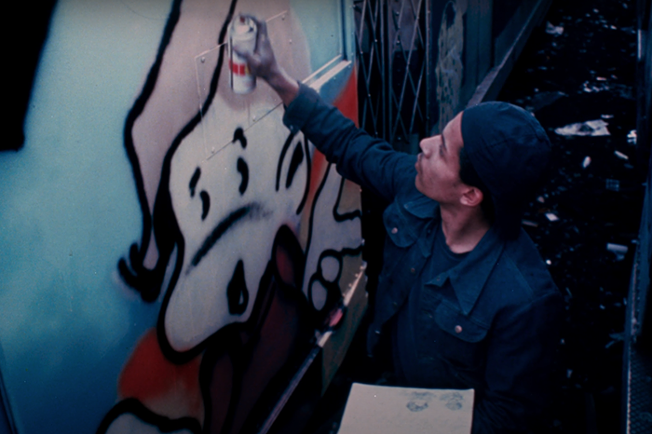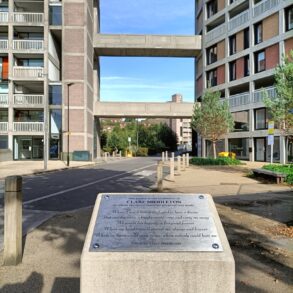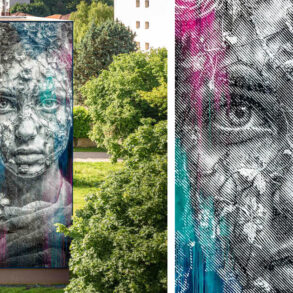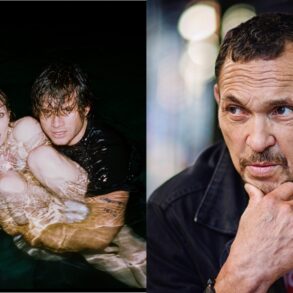Photo: Courtesy of Pittsburgh Sound + Image” class=”uk-display-block uk-position-relative uk-visible-toggle”>

Photo: Courtesy of Pittsburgh Sound + Image
Style Wars
“To some, it’s art. To most people, however, it’s a plague that never ends.” So goes a piece of opening dialogue in Style Wars, a 1983 short documentary renowned for capturing New York City’s then-growing hip-hop and graffiti arts scene. Read by late actor Sam Schacht in a scholarly, PBS-friendly tone, the quote sums up the main conflict of the publicly-funded film, which has become a treasured artifact depicting the birth and early lifespan of a major city’s underground culture.
The work also speaks to issues still affecting cities today, especially when it comes to policing and gentrification. A group of local artists, public figures, and others will discuss the film’s impact and how it relates to Pittsburgh when the Carnegie Museum of Art hosts a screening and panel event.
Pittsburgh Sound + Image — a group dedicated to highlighting art films, many with local ties — will, on Sat., May 18, present a 16mm print of what they describe in a press release as a “landmark street art documentary” that “captures the burgeoning art forms of graffiti, break dancing, and rap in New York right as they’re about to break into the mainstream.” The event will include a talk by Henry Chalfant, a Sewickley native who co-produced the film with director Tony Silver.
“We’re screening Style Wars first and foremost because it’s an important film,” says Pittsburgh Sound + Image director of programming Steven Haines, who will appear at the event. “Its existence and documentation of an early wave of hip-hop culture in New York City is of incalculable cultural and historical value. And the questions the film raises about what is art, how individuals and institutions define the term, and what motivates artists to create are of continual relevance. I’m sure all of that sounds lofty, but Style Wars has earned it. Its reputation certainly precedes our screening.”
Haines adds that the screening was made possible because of another documentary, Spang’s First Century, a silent 1920s Pittsburgh industrial film preserved by Pittsburgh Sound + Image and scored by local musicians. The film happens to depict an Etna-based steel manufacturer co-founded by Chalfant’s family.
“Henry reached out to me last year when he heard about that project. I didn’t recognize his name at first, so we got to chatting, and he shared the bombshell that he was one of the folks behind Style Wars. My head was spinning. My first two questions to him were, ‘Do you have a 16mm print we can show?’ and ‘Will you travel to Pittsburgh?'” says Haines.
Photo: Courtesy of Pittsburgh Sound + Image” class=”uk-display-block uk-position-relative uk-visible-toggle”>
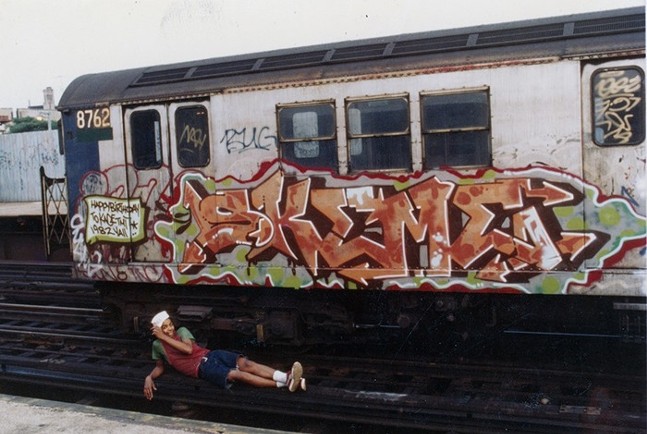
Photo: Courtesy of Pittsburgh Sound + Image
Style Wars
Clocking in at just under 70 minutes, Style Wars immortalizes an era of NYC now romanticized by wannabe urbanites yearning for a grittier metropolis, one where CBGB still exists, rent has yet to skyrocket, and former Mayor Rudy Giuliani has yet to Disney-fy Times Square. A big part of that era included young artists who, under the cover of night, spray-painted trains, buildings, and underpasses, and, in the process, created a new art form that, as the film shows, was later co-opted by gallery owners looking for the next hot thing.
This explosion of new art, intersected with breakdancing and rap music, was not without its critics (in the film, the visibly weary mother of one 17-year-old artist calls it “a whole miserable subculture”), and was criminalized as vandalism, to a degree where then NYC Mayor Ed Koch suggests, perhaps facetiously, that the MTA use wolves to patrol train yards. That many of the artists were Black and Latino teenagers from low-income backgrounds points to some degree of racism driving the city’s extreme reaction to their work.
Max Gonzalez, a local street artist-turned-muralist set to speak at the screening, knows all too well the lengths a city will go to crack down on graffiti. Known by their tag “GEMS,” Gonzalez became one of the Pittsburgh Bureau of Police Graffiti Squad’s most-wanted vandals. They were arrested in 2016 and charged with over $114,000 worth of damage. All in all, Gonzalez was reportedly ordered to pay a $38,141 restitution fee, do 300 hours of community service, and serve one year of house arrest, followed by three years of probation.
Since then, Gonzalez, a self-described “queer-identifying, Chicano artist” who grew up in Chicago and graduated from Carnegie Mellon University, has become a respected voice in the local scene, with numerous exhibitions and community projects to their name. However, they still deal with the costs of their street art past. Gonzalez tells City Paper that the restitution was “approximately $54,000 (with court costs and everything).” They still owe around $32,000, and will not get off probation until they pay the full amount.
“My sentencing was in 2017, so I have been on probation since then,” Gonzalez says.
Photo: Courtesy of Pittsburgh Sound + Image” class=”uk-display-block uk-position-relative uk-visible-toggle”>
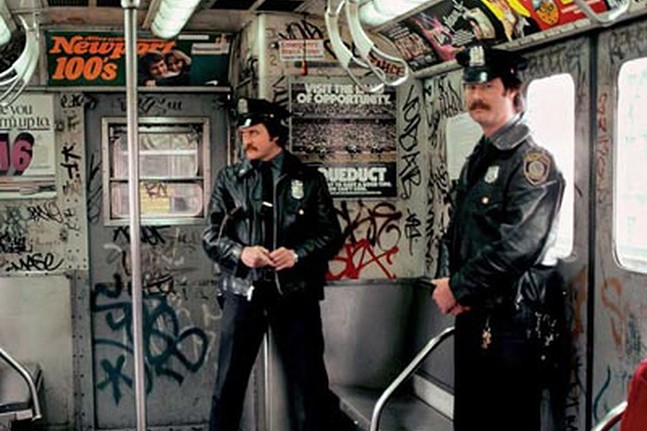
Photo: Courtesy of Pittsburgh Sound + Image
Style Wars
Gonzalez says Style Wars is “largely responsible for the internationally explosive growth of modern hip hop graffiti,” adding that, as Chalfant “found success in NYC with his photography of graffiti, his hometown of Pittsburgh would react to the cultures he helped propagate with intense hatred and a lack of understanding.”
“Pittsburgh is just now starting to see a major growth in its spray can art/muralism market, as most other major cities have had these well-established for decades,” they say, explaining that, since 2019, that growth has provided them and their painting partner Shane Pilster (who will also appear at the screening) with careers as full-time muralists, adding that “there is still much more room in the market for other artists.”
Despite this, they believe various factors have done a lot to scare off street artists, including what they claim are Pittsburgh arts leaders refusing to support or allow work made with spray paint, and the threat of being overly criminalized. The latter includes Gonzalez’s locally high-profile case, and that of HERT and the late Daniel Montano, aka MF1, Pittsburgh graffiti artists who, like Gonzalez, faced hefty fines and penalties, including prison time.
“With all of this known, it does feel a bit surreal and ironic to be able to have a screening of Style Wars at the Carnegie Museum of Art,” says Gonzalez. “It is absolutely needed and I’m glad that Chalfant is receiving some opportunities and praise in his hometown, but the attitude of esteem for his work should be shared to the graffiti artists of Pittsburgh, who would not have experienced this culture in the same way if not for Chalfant’s efforts. “
In addition to Gonzalez and Pilster, multimedia artist Njaimeh Njie and arts journalist Emma Riva will provide more context on the experiences of working creatives in Pittsburgh. Also appearing are City Councilmember Khari Mosley and Stealth-1, a DJ and member of the local Get Down Gang breakdancing crew.
Despite being made 40-plus years ago in a different city, Style Wars speaks to Pittsburgh’s latest ongoing transformation and, potentially, the distinct culture and inhabitants that become overlooked or removed in a rush to create a more tourist and business-friendly destination. While NYC may attract millions of visitors and dream-chasing transplants from all over the world, the aspects that made the city so dynamic in the first place have become lost.
The makers of Style Wars sought to capture a fascinating community, one that boasted its own language, relationship dynamics, and diverse members (the subjects range in age from 14 to artists who appear to be in their 30s), as well as internal conflicts, something observed when one agitator sets out to destroy the work of others in what would become the film’s title.
Style Wars also seeks to understand those so driven by artistic pursuits they’re willing to risk their freedom and safety, even if it means exploring condemned portions of the NYC subway system. They do so with few resources and seemingly little reward beyond being recognized by fellow street artists. With this in mind, street artists like Gonzalez believe the city might do better by calming its punitive mindset and viewing local graffiti “vandals” as trying to make their mark in a city that would rather erase them.
Pittsburgh Sound + Image presents Style Wars with Henry Chalfant. 2-4 p.m. Sat., May 18. Carnegie Museum of Art. 4400 Forbes Ave., Oakland. $10. pghsoundandimage.com
This post was originally published on this site be sure to check out more of their content.




